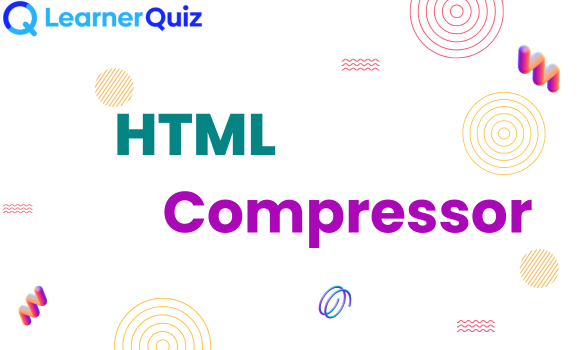HTML Compressor
Enter your HTML code to compress:
Add up to 10 multiple HTML files (Size Limit: 2MB per file)
About HTML Compressor
HTML Compressor: Why It's Essential for Your Website
The world today more often than not is said to be a fast moving world, literally everything needs to be fast. Speaking about web sites, the speed of loading is the primary determinant of its usability, positions in SERP, and conversions. It may sound a little unusual, but the use of an HTML compressor is considered one of the effective ways for improving the loading speed of your website. This tool minimizes your HTML files to load faster but it does not in any way change your contents or their layout.
But why does this matter? Let's explore.

1.What is an HTML Compressor?
HTML compressor is an application which aims at compressing file size of web page coded in HTML by removing unnecessary space, comment or blank lines. These “extra” elements are quite useful to the developers, particularly during the coding phase, but they add no value whichever stage the code is at. This involvements still apply to the concept of compressing or “minifying” an HTML tag in order to decrease the file size by which one’s site loads.
2.How Does it Work?
Here's how an HTML compressor works:
Removes White Spaces: Browser does not require white spaces such as extra space between tags and lines or between two lines. Saving them removes them hence saving on bytes.
Deletes Comments: It is also very common to find certain words or messages that users write in code to make it easier to perceive. But they don’t serve any purpose to users anymore. These comments are removed by the compressors thus reducing the size of the file in question.
Shortens Inline Code: HTML compressors also remove extraneous characters including CSS or JavaScript codes which are written between the HTML tags.
3.Why is HTML Compression Important?
They both share the same belief in one concept – the need to proceed swiftly in order to meet the demands and needs of the users as well as to achieve good ranking in the search engine result pages. It has been reported that one second page load time can cost 16% of user satisfaction and it can have 7% direct impact on conversion rates. The time it takes for a website to load has a direct impact into the user retention where faster loading times mean users will stay longer, view more pages and possibly buy.
4.Key Benefits of HTML Compression
Faster Load Times: HTML compression speeds up loading times, which improves the user experience.
Improved SEO: Since Google ranks faster websites higher, compressing HTML can improve your search engine ranking.
Reduced Bandwidth: Compressed HTML files use less bandwidth, which can save you money on hosting costs, especially if your site has heavy traffic.
Better Mobile Experience: Mobile users, in particular, benefit from faster websites, as many are still on slower 3G or 4G networks.
Conclusion
Using an HTML compressor like ours is one of the simplest ways to boost your website’s speed, improve SEO rankings, and offer a better experience to users. By removing unnecessary spaces and comments, you can significantly reduce your file sizes, saving bandwidth and making your site much faster.
-
Popular SEO Tools
- Plagiarism Checker
- Article Spinner / Rewriter
- Keyword Position Checker
- Grammar Checker
- Domain Authority Checker
- Pagespeed Insights Checker
- Image Compression Tool
- Reverse Image Search
- Page Authority checker
- Text To Speech
- Backlink Checker
- Alexa Rank Checker
- Backlink Maker
- Domain Age Checker
- Website Ping Tool
- Website Seo Score Checker
- Keyword Density Checker
- Website Page Size Checker
- Word Count Checker
- Mozrank Checker
.png)